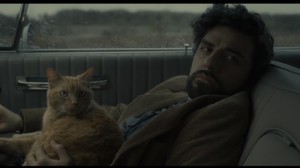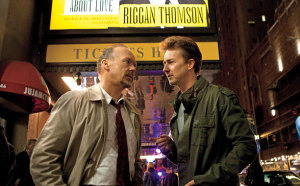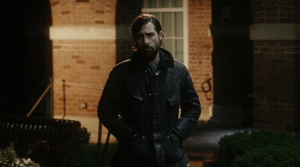Unlikeable protagonists have been having something of a Renaissance as of late (so much so that some of us at Sports Alcohol have gone so far as to wonder if we aren’t unlikeable protagonists ourselves). They can be found anywhere, of course, but many films tend to show them thriving (or at least getting by) in the art world. This makes sense, as it’s a place uniquely suited to the working out of personal demons in a public arena – and film is a format uniquely suited to displaying that struggle in immediate and imaginative ways. Three recent films, Inside Llewyn Davis, Birdman, and Listen Up Philip, have done just that, grappling with the great divide that often opens between creators and their creations, particularly once said creations are out in the world for others to consume. Though their chosen mediums vary, from music to theatre to fiction, one thing unites the three artists portrayed in these films: they are total bastards.
“I don’t see a lot of money here.”
We first meet Llewyn Davis at the end – though we don’t know this yet and he certainly doesn’t. Llewyn is a folk singer, based at least in part on real cultural figure Dave Van Ronk, with the misfortune of having talent without distinction, not to mention terrible timing when it comes to musical trends. The film opens with him crooning the aptly chosen number “Hang Me, Oh Hang Me” to a smoky coffee shop of polite patrons who will forget him as soon as he leaves the stage and, in its elegant seashell construction, ends here too. But I’m getting ahead of myself.
Llewyn has recently lost his performing partner to suicide but this appears to be just the latest in a continual line of setbacks and disappointments for him. A native son of working class Queens and former merchant marine, every aspect of Llewyn’s life is a hustle, highly dependent on the kindness of those around him even when he feels no compunction to offer kindness himself. He reserves his harshest judgments for his fellow musicians, and when his lips aren’t curled in a critical sneer his face is etched with the resignation of a man who knows his next worst day is just around the corner. The only time he seems at peace is when he’s performing, when the desperation of his life can be poured into song.
Singers like his friends Jim and Jean, the latter of whom Llewyn has just inconveniently knocked up, are seeking success because they ultimately seek comfort, willing to compromise their art on novelty singles for a chance at radio airplay. Though Llewyn often seems just as willing to do the same, he’s too shortsighted for longevity, signing away his royalties on one such single to get a paycheck up front or dropping everything for a cross-country road trip to play for a star-making agent. “You should find a partner,” he tells him, unaware that Llewyn had one who jumped off the George Washington Bridge, now lingering in his life like a ghost.
As realized by the Coens, Llewyn carries on their great tradition of put-upon antiheroes. Many of their films have cast a frustrated man into purgatory but in this case even the structure of the story is against Llewyn. As the film begins winding down it also circles back to that smoky coffee shop and its back alley where earlier a mysterious man menaced Llewyn for reasons unknown. Cold-cocked for heckling the man’s wife the night before, Llewyn will have the chance to fight another day. But he will not change and his knowledge of this gives Inside Llewyn Davis a poignant and elegiac tone. Trapped in a cycle of stubborn assholery, he will be passed over by the movement he loves as so many worthy artists of the day were. Fittingly when the film cuts to black and the credits begin to roll, it’s Bob Dylan who provides the music.
“Popularity is the slutty little cousin of prestige.”
This line is spoken by Mike Shiner, a vain and pompous actor whose idea of Method authenticity is installing a tanning bed in the theatre’s basement and getting drunk onstage. He has been brought on last minute by Riggan Thomson, who became famous playing the uperhero Birdman and is now washed up and attempting a Broadway comeback, writing, directing, and starring in an adaptation of Raymond Carver’s “What We Talk About When We Talk About Love.” It’s a desperate gambit within a desperate gambit, adjacent to yet more desperate gambits, and in Alejandro Gonzalez Inarritu’s pressure cooker of a showbiz satire, everything in Riggan’s production is perpetually on the verge of disaster.
Riggan is also attempting to prove himself in a hostile world though, unlike Llewyn, he’s already experienced success and squandered it. The exact nature of his fuck-uppery is never made clear though his laxity with alcohol and the presence of his neglected, recently rehabbed daughter suggest a familiar story of Hollywood hubris and decay. He’s also susceptible to delusions, particularly the voice of his Birdman persona, which speaks to him in a Christian Bale-ish growl, goading and taunting Riggan when things aren’t going the way he’s planned, which is most of the time. That he’s chosen one of Carver’s most iconic stories to adapt points to both his arrogance and laziness though his connection to the material seems tenuous and whether he’s actually a good performer is of less importance to Inarritu than what’s going on in his head. It’s only there, the film suggests, that Riggan, and his art, can truly take flight.
Theatre is a medium that often requires playing to the cheap seats and Inarritu replicates that performative hysteria in his filmmaking. Birdman is cleverly cut to look like one continuous shot, the camera swirling woozily around the onstage sets where the actors rehearse and the backstage dressing rooms where they clash, building to the electric tension of the play’s opening night. The technique is immersive in more ways than one: structurally it captures the entirety of the theatrical world, rarely departing from the St. James and its surrounding city blocks. It also means we almost never deviate from Riggan’s point of view. What’s real and what’s imagined by an unhinged man is constantly blurred. When his delusions literally lift him into the air, flying above the city on Birdman’s wings, we’re along for the ride whether we like it or not.
Though Riggan is not explicitly based on any one actor, the casting of Michael Keaton gives a funhouse mirror context to the role, and the genuine pain he projects into his character suggests depths the script often withholds in favor of blunter commentary. In the world of actors like Mike Shiner popularity and prestige can only be achieved at the expense of one another. But Riggan, like the film that surrounds him, is willing to sacrifice everything for both in ways phonies like Mike can only feint toward, even if it takes a little metaphysical noodling to get there. In the end an artist lives and dies by what he believes about himself. If he can take a critic down a peg or two while he’s at it, all the better.
“Well, you’re a cruel and miserable person so it makes sense you’d end up in a miserable situation.”
While both Llewyn Davis and Riggan Thomson struggle with the bitterness that comes with unrealized or compromised dreams, Philip Lewis Friedman of Listen Up Philip embodies the slow poisoning of the soul that success can inflict on someone who already wasn’t a great guy to begin with. He’s undoubtedly the biggest asshole of the three discussed here, which is apt given his chosen medium of fiction (as a fellow fiction writer, I’m relatively qualified to say this). Writers, unlike musicians and actors, create their work in a solitary vacuum without the benefit of collaborators or the promise of a performance, and such an insular, distinctive form of art requires a dogged persistence that borrows equally from self-delusion and self-aggrandizement. While writing may be the natural mode of artistic expression for introverts it draws a fair amount of entitled showboaters too, cannibalizing their own biographies and the lives of their loved ones when necessary.
We are introduced Philip just prior to the publication of his second book, Obsidiant, as he meets an ex-girlfriend for lunch and proceeds to chew her out for being late and not believing in him when they were together. His righteous fury crystallizes into smug satisfaction, a feeling so satisfying, in fact, that he then meets up with an old workshop classmate to do the very same thing. He’s dismissive and condescending in almost every interaction we see him in, including with his publishers and live-in girlfriend. In one mordantly funny bit, he rues a missed opportunity with another wunderkind who has recently committed suicide. “Doing that interview would have been really great for me,” he notes. “Last interviews are hard to get. Because you never know.” He’s also seeking escape from his life in New York City which is where Ike Zimmerman, a Roth-ian aging iconoclast, comes in, offering the star struck Philip an extended stay at his isolated summer house.
Zimmerman is also an asshole though he has both the advantage and curse of age on his side. Advantage because he has no incentive to change, curse because the blunders of his younger days still linger, in particular his daughter who has her father’s bilious wit and none of his disregard for others. Naturally, Zimmerman has a persuasive effect on his young protege but the influence is mutual as the two enter into a relationship of symbiotic monstrosity. Zimmerman gets Philip a cushy job at a private school; Philip inspires Zimmerman to party like he’s forty again. Through it all Philip remains unsatisfied and yet when he attempts to return to his previous life he is denied the comforts he once spurned, leaving him worse off than he was before.
Philip has a great need for control and for the people around him to interact with him in the ways he expects them to. Though the film never offers any excerpts from Philip’s work as proof, it’s implied that this compulsion for creative dominance is what may make him an insightful writer but a horrible person. And yet, in one of the film’s many meta touches, he is also the pawn of a fickle creator, his story frequently intruded on by a narrator who wryly comments on the action and is mercilessly frank in ways even Philip can’t be, particularly when it comes to himself. He will not be spared, as the closing narration of the film makes clear, and will spend much of his life in a lonely carapace of his own devising but it feels like less a comeuppance than an inevitability. Misery loves company, as they say, and when you’re an author, your company is the world you write to. Even if all you can offer is a piece of paper with some staples in it.
- The SportsAlcohol.com Podcast: Oscar Special 2024 - March 8, 2024
- The SportsAlcohol.com Podcast: The Best Movies of 2023 - February 28, 2024
- The SportsAlcohol.com Podcast: Best Music of 2023 - February 9, 2024



